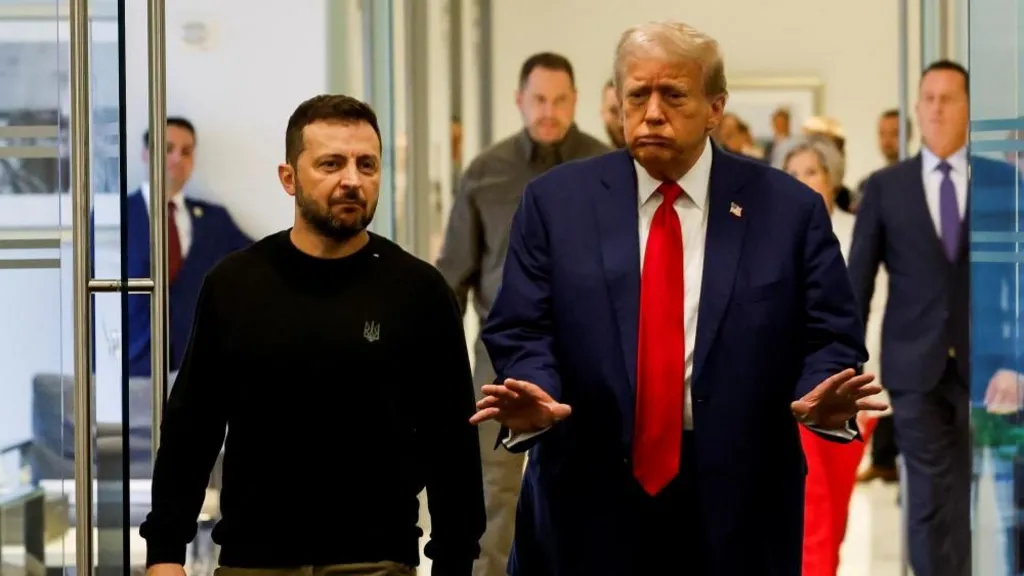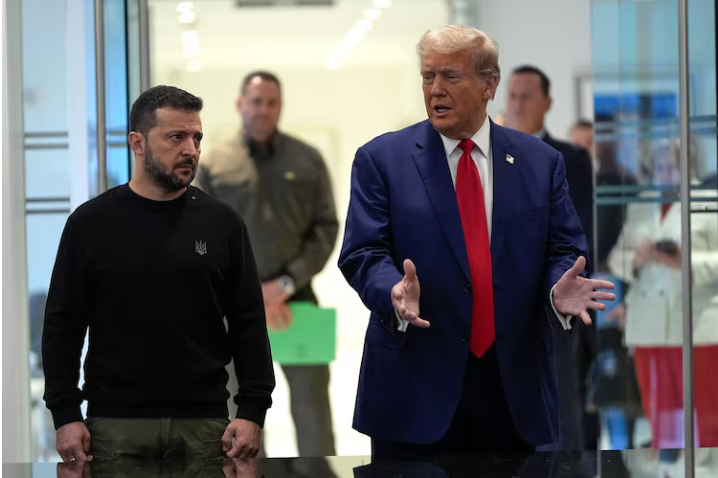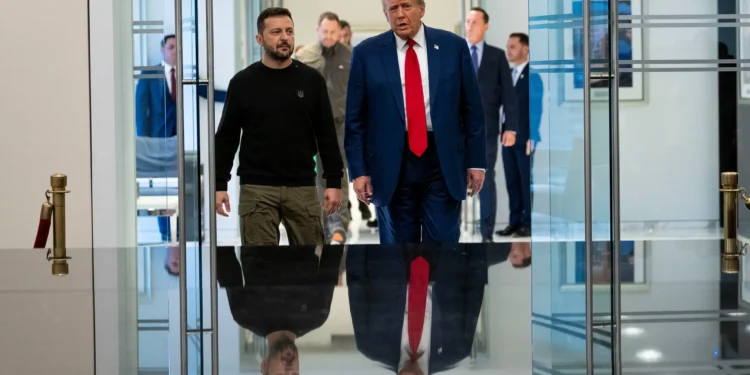Trump meets Zelensky
Former President Donald Trump’s views on the Ukraine’s war continue to stir up debate. He is trying to be seen as a possible peace maker. Recently, in New York, Trump met with Ukrainian President Volodymyr Zely. During this, Trump said again that he could quickly end the conflict if he wins the election in 2024. Standing next to Zelenskyy, he stressed that he believes he has good relations with both Zelenskyy and Russian President Vladimir Putin. Trump sees this relationship as key to achieving peace. He mentioned that both sides want the fighting to stop, and even hinted that Putin might also seek a resolution to the conflict.
This meeting took place while Kyiv worried about ongoing support from America if Trump returns to power. It highlighted some tension between these leaders. Zelenskyy, who has often criticized Trump’s views on Ukraine, was careful but hopeful during their discussion. He shared his desire that both leaders could work together to end the war, making sure Putin does not win. Nevertheless, there is worry in Ukraine about Trump’s possible return. Many fear a Republican-led government could push Kyiv into making unwanted territorial deals with Russia for peace.
During their conversation, Trump kept bringing up the idea of a “fair deal,” something he often says about complex global matters. He labeled the war as something that should “never have happened” and partially blamed current U.S. President Joe Biden for its continuation. Although Trump did not clarify what a “fair deal” would look like, he stressed his belief that both Ukraine and Russia want to finish this conflict quickly. Critics argue that his views minimize the unprovoked nature of Russia’s invasion, which breaks international law. By not clearly holding Putin responsible for starting this war, questions arise regarding how Trump hopes to establish lasting peace.
Zelenskyy believes Ukraine must win and his priority is driving Russian forces out of seized regions. During their meeting, he made clear that any agreement needs to have Russian troops leaving Ukrainian land—a point Trump avoided answering directly. Instead of providing specific ways to achieve this without risking Ukraine’s sovereignty, Trump concentrated on the need for an end to hostilities.

As the presidential election approaches in the U.S., Ukrainian strategy hangs in the balance. Zelenskyy recognizes that American support might shift drastically if Trump wins. The stakes are incredibly high for Kyiv at this juncture. Zelenskyy emphasized during his visit that Ukraine requires increased military assistance from the U.S., contrasting sharply with Trump’s past criticism of spending aimed at supporting Ukraine. Trump has repeatedly claimed that all those billions spent for Ukrainian defense could instead help Americans at home—a stance popular with parts of his party who are tired of foreign commitments.
The meeting with Zelenskyy followed a rally in North Carolina where Trump expressed some of his strongest critiques yet regarding Zelenskyy and Ukraine itself. He argued that the war has devastated Ukraine and led to needless losses, stating even a “bad deal” would be better than the ongoing situation. Furthermore, he suggested if an early settlement had been reached, cities ruined by the fighting could have been spared—implying that Ukrainian resistance is causing unnecessary suffering.
Such statements have drawn sharp backlash from many Democrats & some Republicans alike. For Zelenskyy, it seems Trump’s narrative not only calls for peace but portrays Ukraine as prolonging the conflict by unwillingness to make territorial compromises. On another hand, Zelenskyy emphasizes Ukraine’s struggle as one for independence and global order; thus any settlement leading to loss of land is out of question.
Additionally, Trump’s portrayal of what Putin desires creates controversy too. In New York, he said Putin wants peace just like Ukraine does—such claims overlook that Russia can halt its invasion whenever it chooses by withdrawing its forces from Ukrainian lands. Trump’s idea of mutual yearning for peace overlooks serious power issues at play—like Russia continuing its occupation of Crimea & eastern parts of Ukraine.
Moreover, framing the war as something “that should never have happened,” while avoiding clear acknowledgment when blaming Russia raises concerns among critics too. Words like these seem to let Putin off easy, framing the situation almost like a natural disaster instead of a direct consequence of Russia’s actions—this fits into Trump’s broader pattern of hesitance when speaking against Putin throughout his public life.

Former President Donald Trump meets with Ukraine’s President Volodymyr Zelenskyy at Trump Tower
The implications surrounding Trump’s potential return to power carry significant weight for Ukraine’s future outlooks. Should he win again, Trump has pledged to settle matters within “24 hours,” but many worry achieving such a speedy conclusion may mean compromising on Ukrainian land rights during negotiations—to which Zelenskyy has firmly declared they will never agree.
In contrast stands President Biden’s consistent backing toward Ukraine—calling other nations together & bolstering military aid so they can fend off Russian aggression effectively remains vital too; he describes this battle as crucial for democracy & international lawful standing exchanging sharply with Trump’s more transactional style taken in relations.
Navigating this precarious political scene becomes essential for Zelenskyy moving forward since U.S support is critical against Russian pressure yet uncertainty looms over 2024 elections dictate moves carefully ensuring protection regardless who prevails at polling time.
To sum it up: Trump’s recent discussions with Zelenskyy reflect two starkly different approaches concerning how best address ongoing turmoil facing Ukraine today versus Trump’s fast-track proposals lacking deeper accountability measures required holding responsible parties aligned—in turn prompting challenges needed further securing regions independence without sacrificed territory ahead concerned political forecasts evolve swiftly toward inevitable vote outcome needing adapt quick reactions from involved players across space allocated time ahead!

























